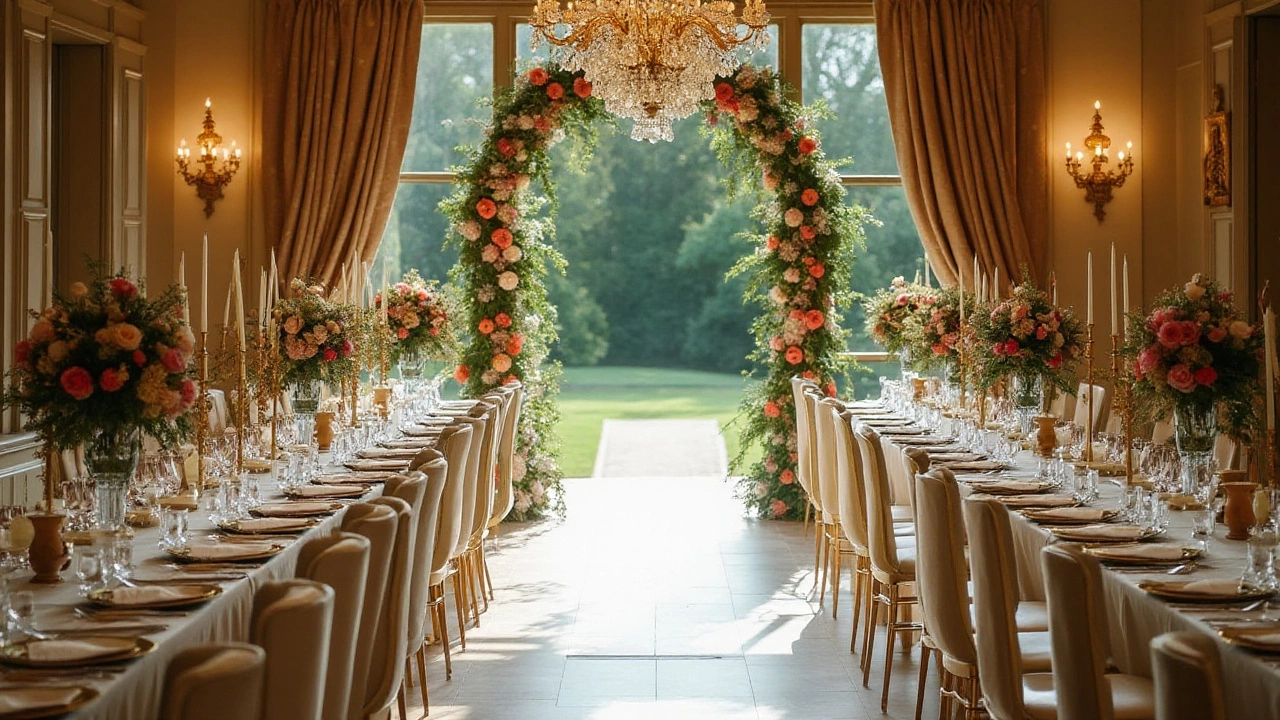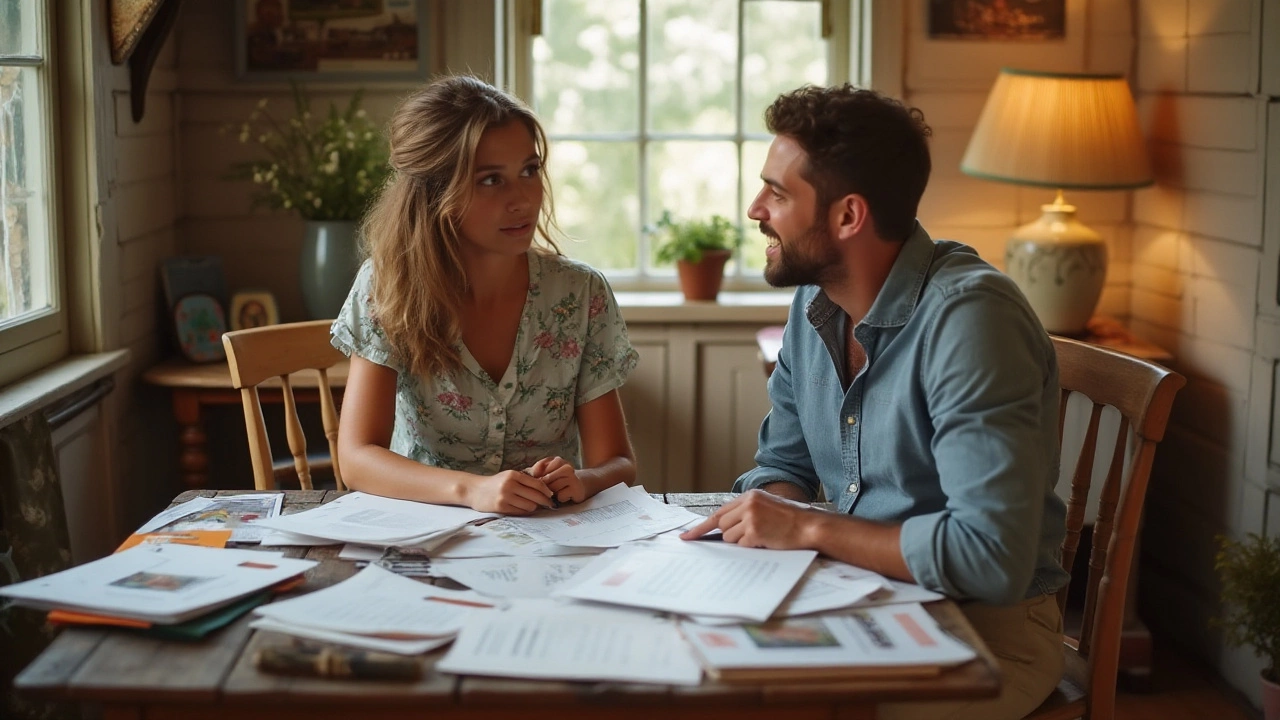Planning a wedding can be one of the most exciting yet financially daunting experiences. While every couple dreams of a perfect day, setting a well-thought-out budget is crucial. A significant portion of wedding expenses often goes to securing the venue, a decision that requires careful consideration and planning.
In this guide, we'll explore the essentials of crafting a wedding budget, with a particular focus on venue-related costs. From understanding what affects these costs to discovering money-saving tips and tricks, you'll gain insight into how to manage your expenses smartly. Imagine not just an unforgettable day but also one that doesn’t break the bank.
Whether opting for a grand ballroom or a quaint backyard setting, knowing what to expect and how to optimize your budget can make all the difference. Read on for a comprehensive exploration of wedding budgeting, tailor-made for savvy couples ready to embark on their planning journey.
- Understanding Wedding Budgeting Basics
- Factors Affecting Venue Costs
- Budget-Friendly Venue Options
- Tips for Negotiating with Venues
- Creative Ways to Save on Venue Costs
Understanding Wedding Budgeting Basics
Creating a wedding budget is the foundation of successful wedding planning. One must start by determining the total amount they are willing to spend on the event. This requires an earnest examination of both personal savings and potential contributions from family members. It's essential to decide on a figure that won’t lead to financial stress post-wedding, considering future expenses such as a honeymoon or even buying a house.
The next step involves allocating these funds intelligently across various categories, with venue costs often taking a large slice of the pie. According to a comprehensive survey by The Knot, the average cost of a wedding in the United States is approximately $30,000, and nearly 50% of that can go towards the venue, catering, and rentals alone. This highlights the importance of strategic allocation, prioritizing elements that carry personal significance while staying flexible for unexpected expenses.
To set a realistic budget, couples should begin by listing all conceivable expenses including venue rental, attire, photography, and entertainment. Having a detailed spreadsheet can help keep track of costs and also provides a clearer picture of areas where one might overspend. Many wedding planners suggest setting aside 5-10% of the budget as a contingency fund for those surprises that inevitably pop up.
It's helpful to categorize your spending into 'must-haves' and 'nice-to-haves'. This can be a guiding principle when deciding where to allocate resources, ensuring that the essential elements are covered before splurging on extras. For instance, those with a passion for live music might choose to invest more significantly in a band, while others might prioritize a stunning location. According to celebrity wedding planner Mindy Weiss, "Remember, the magic of your day is created by the moments, not the price tag of the elements."
Of course, budgets are not set in stone. They evolve as plans change and new options emerge. Regularly revisiting and adjusting your budget is advisable as it keeps expectations realistic and helps avoid disappointments. Importantly, open communication between partners throughout this process ensures that both parties feel heard and that decisions made reflect mutual desires and compromises.
One cannot underestimate the impact of industry trends on budgeting. Seasonal variations, regional cost differences, and even the day of the week can play significant roles. A weekend summer wedding in a high-demand city can be considerably more expensive than a weekday winter ceremony at a countryside venue, offering a more affordable wedding option. Many venues offer discounts for off-peak events, which can also include Friday or Sunday weddings.
"A flexible approach to both date and budget can lead to unique opportunities and significant savings," advises Darcy Miller, author and editor at large of Martha Stewart Weddings.
Factors Affecting Venue Costs
When planning a wedding, one quickly realizes how significantly venue choice can influence the budget. Several elements contribute to venue costs, each playing a crucial role in determining the final price. First and foremost, the location of the venue is a chief determinant. Venues situated in metropolitan areas or scenic countryside locations often come with a higher price tag due to demand and the allure of picturesque surroundings. Proximity to major transportation hubs can also elevate costs, as they offer convenience for guests traveling from afar.
The size of your guest list is another vital factor. Larger venues, capable of accommodating more people, tend to charge more, not just for space but also for added amenities. It's essential to consider how the number of attendees aligns with the venue's capacity to avoid paying for unused space. Additionally, the time of year plays a pivotal role. Most couples aim for weddings during peak seasons like summer or early autumn, which drives up prices due to high demand. Conversely, opting for a wedding in the off-peak months might provide cost advantages.
Venue costs can also be influenced by the included services. Some venues offer full-service packages covering everything from catering to decorations, which, while convenient, can add to the expense. Comparing such options with venues that allow you to bring in outside vendors may uncover potential savings. An often-overlooked aspect is the duration of the event; extended hours might incur additional charges due to staffing and other operational costs. Therefore, it's crucial to understand the venue's policies regarding timing and any extra fees that might apply.
An interesting insight shared by The Knot states, "Couples who choose a non-traditional venue often save significantly on venue costs, yet still achieve a highly personalized day." This highlights the trend of selecting unique venues like art galleries or historic homes, which may offer not just uniqueness but also competitive pricing. Exploring such alternatives can lead to substantial financial benefits while crafting a memorable experience.
Moreover, trends and statistics underline notable differences in costs across regions. As encapsulated in the table below, variations in venue pricing can be immense, emphasizing the importance of regional considerations in budget planning.
| Region | Average Venue Cost |
|---|---|
| New York City | $15,000 |
| San Francisco Bay Area | $12,000 |
| Midwest Rural Areas | $5,000 |
Ultimately, understanding these factors enables couples to approach their wedding budget with greater foresight and adaptability. By weighing each aspect's impact, they can effectively tailor their choices towards affordable weddings while ensuring their dream venue fits both style and financial expectations. Knowledge of these key elements lays the groundwork for strategic planning and decision-making, essential steps in orchestrating the wedding day without financial strain.

Budget-Friendly Venue Options
Deciding on a wedding venue that fits both your dream and budget can be a thrilling yet challenging task. Luckily, there are countless budget-friendly venue options to consider that won't require sacrificing your vision. With a little creativity and research, finding a venue that suits your style and wallet is possible. One tip is to explore local parks and community centers, which often have stunning landscapes and spacious halls at a fraction of the cost of traditional venues. These locations can provide beautiful backdrops for ceremonies, especially during the spring and summer months when nature is at its most vibrant.
Another excellent option is hosting your wedding at a private residence, either yours or that of a family member or friend. This can significantly cut costs while adding a personal touch to your celebration. Of course, renting any necessary equipment or hiring staff might still be required, but these venues offer greater flexibility in terms of decor and schedule. Additionally, unconventional venues such as museums, libraries, or art galleries have become popular choices for affordable weddings, offering unique spaces that intrigue guests and often provide their own amenities, making planning much simpler.
Consider also the off-peak seasons or days for your wedding, as many venues provide discounted rates during these periods. Hosting your wedding in the winter or mid-week can lead to considerable savings, freeing up more of your budget for other elements like catering or entertainment. As noted by the Wedding Report, avoiding the typical wedding season can reduce venue costs by up to 30%.
"A shift to a less popular date can present substantial savings opportunities, allowing couples to invest in other dream elements for their special day," highlights wedding expert Jane Smith of Bridal Bliss Magazine.
A strong trend in the wedding landscape is DIY or pop-up venues, where couples rent out unconventional spaces like barns, warehouses, or lofts and transform them with personalized details. This approach allows for creative freedom and often leads to a more intimate and meaningful celebration. Many couples enjoy the challenge of decorating a blank canvas to reflect their unique love story. When considering this route, bear in mind factors such as accessibility for guests and permit requirements that might be needed for certain locations.
Next, explore small businesses or recently opened venues that might offer introductory rates or promotional discounts as they build their clientele. It's an opportunity to take advantage of a venue eager to grow its reputation while offering you a great deal. Always remember to inspect the venue and clarify all terms in a contract to ensure there are no hidden fees. Whether through strategic negotiation or careful planning, your dream of a beautiful wedding venue within budget is entirely achievable with these insightful tips.
Tips for Negotiating with Venues
Negotiating with wedding venues can feel as intricate as planning the wedding itself, yet it offers a rewarding opportunity to manage costs effectively. The process often begins with a thorough understanding of your own budget expectations and how they align with the venue's offerings. Remember, no two venues are alike, and costs can vary based on location, season, and the popularity of the date selected. It's crucial to enter negotiations with a clear and detailed overview of what you value most in a venue, whether it's breathtaking views, exquisite architecture, or spacious interiors. Preparation, after all, is key in ensuring both sides can arrive at a mutually beneficial agreement.
One effective approach is to schedule your wedding during off-peak seasons or on days that are less desirable for other couples. Typically, venues are more willing to offer discounts on Fridays, Sundays, or even weekdays when demand is lower. It’s also wise to inquire if the venue provides any bundled packages, as these can include catering, decorations, or even entertainment services at a reduced cost. By showing interest in multiple dates and demonstrating flexibility, you could secure a significant reduction in venue fees while still securing a date that matches your vision.
Clearly articulate your budget constraints during the negotiation process as transparency is often appreciated and can lead to venues becoming more accommodating. A well-prepared couple could benefit from knowing average costs and potential added fees in advance. According to a survey by The Knot, venue rental can constitute up to 30% of the total wedding budget, making it one of the heftiest expenses. Armed with this knowledge, couples can engage in more informed discussions, asking venues to break down the quotes provided and check if there are any hidden costs, like corkage fees or overtime charges.
Consider asking for added value in lieu of discounts. For example, inquire if additional services or amenities could be included without extra charge. Many venues are open to providing extras, such as additional decor, lighting enhancements, or extra seating arrangements, if direct monetary negotiations hit a standstill. This is your day, and many venue managers are eager to help customize the details to ensure it’s perfect for you. Wedding planning is not just about cutting costs but enhancing value, and sometimes a little creativity and communication go a long way.
Finally, it’s beneficial to maintain a positive and courteous demeanor throughout the negotiation process. Aim to build a relationship with the venue manager or coordinator rather than approaching the conversation solely as a transaction. This rapport can often lead to goodwill gestures and the impression of you as desirable clients whom the venue would like to attract. Not only does negotiating tactfully secure the best possible package, it also sets a constructive tone for all the collaboration to follow as your big day approaches.

Creative Ways to Save on Venue Costs
Weddings are a celebration of love, and while every couple desires an enchanting milieu to host their day, it's worth exploring ways to save on the cost of your wedding venue. The quest for affordability does not mean compromising on charm or style. Instead, it invites creativity and thoughtful consideration of priorities. By being flexible with dates, for instance, couples can genuinely save. Off-peak months—January, February, and even November—often see venues offering better rates due to lower demand. Weekdays might also present unexpected bargains, liberating budget portions for other essential aspects of the wedding.
Venue selection can be equally strategic. Opting for non-traditional spaces like public parks, art galleries, or even historic town halls can significantly cut costs. These options might come with a clean slate, allowing couples to personalize the space entirely. It's also worth investigating if local community centers or universities offer affordable rental spaces, which many do. Hosting both ceremony and reception in the same venue can eliminate transportation costs and streamline coordination, thus reducing financial pressure.
"Cutting costs doesn't mean cutting corners. Consider it a challenge to make creative choices that reflect your personality," advises wedding planner Lisa Gant. She adds, "Sometimes the most unconventional places can offer the most memorable experiences."
Rental inclusions also play a significant role in wedding budgeting. Venues that provide tables, chairs, and basic linens can help tighten the budget. Those extra expenses can add up quickly if managed separately. Aligning your venue with a comprehensive package—one that offers catering, decor options, or even photography—can simplify coordination and offer bulk discounts. Assembling the right vendor team, sometimes offered in preferred vendor packages by venues, can also hike savings.
Being mindful about guest count directly affects venue size and, consequently, cost. A more intimate gathering can open up exceptional spaces that wouldn't typically accommodate larger crowds. Compiling a thoughtful guest list not only minimizes venue expenses but can enrich the ambiance, fostering a more personal environment.
Opt for DIY and Community Resources
Embracing the effort of DIY can refresh your wedding vision while saving money. If creativity fuels you, consider handcrafting decorations or utilizing community resources like rental décor services that thrive on renewability and affordability. Engaging friends and family in these processes often amplifies the meaningfulness of the occasion while reducing professional costs. Having skilled loved ones contribute through talents in music, floral arrangements, or baking can resonate heartfelt touches throughout the event. Make a list of what you need and what talents within your circle can assist in meeting those needs.Being informed and prepared is key. Always research and compare multiple venues and package offerings within your desired locations. Remember that negotiations are part of the industry. Don't shy away from inquiring about seasonal discounts or special offers, as venues are often willing to create a win-win scenario. A well-planned approach not only helps in sticking to your budget but also crafts a wedding day that echoes your love story without worrisome costs.

